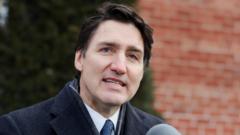In recent remarks, Trump suggested that eliminating the "artificially drawn line" between Canada and the U.S. would enhance national security and could be beneficial for both nations. Asserting that Canada has to enhance its military contributions, he threatened significant tariffs on Canadian goods unless the Canadian government steps up its security measures at the border.
Trudeau's response comes at a tumultuous time for his administration as he has announced his resignation, although he will remain in office until a new leader is chosen within his Liberal party. This leadership transition will occur while Canada's parliament is suspended until late March, further complicating the political landscape.
The economic implications of potential tariffs are significant for Canada, with trade between the two nations amounting to nearly C$3.6 billion ($2.5 billion) daily. Trudeau indicated that Canada might respond with counter-tariffs if Trump proceeds with his threats. Speaking on social media, he emphasized the mutual benefits of the trading relationship between Canada and the U.S.
Moreover, Trudeau's spokesperson highlighted the low levels of drug smuggling at the U.S.-Canada border compared to the southern border, challenging Trump's rationale for increased tariffs. Tensions over security and economic partnerships continue as Canada commits to bolstering its border measures.
In the face of this turmoil, provincial leaders, including British Columbia's Premier David Eby and Ontario's Premier Doug Ford, are preparing to address Trump's threats in Washington D.C. Ford urged that collaboration was essential, proposing an increase in trade ties rather than a rupture.
On a lighter note, Ford humorously countered Trump's comments about statehood by jokingly proposing to buy Alaska and Minnesota in return. This exemplifies the ongoing dialogue amid a politically charged atmosphere, as Canada strives to navigate its relationship with the U.S. while maintaining its sovereignty.


















